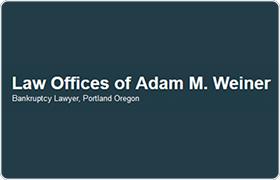Welches Bankruptcy & Debt Lawyer, Oregon
Sponsored Law Firm
-
 x
x

Click For More Info:
-
Law Offices of Adam M. Weiner
8624 SE 13th Ave Portland, OR 97202» view mapBankruptcy & Debt Premier Bankruptcy Attorney
Life doesn’t always have to be hard. Consult with a bankruptcy attorney who looks out for your best interests. Call today to begin the process for a fresh financial start.
503-719-5123
Adam M. Weiner
✓ VERIFIEDBankruptcy & Debt, Credit & Debt, Collection
Adam Weiner has been practicing law in Oregon since May 1998. After successfully spending many years representing individuals in different types of... (more)
FREE CONSULTATION
CONTACTMatthew A. Casper
Litigation, Consumer Protection, Dissolution, Commercial Bankruptcy
Status: In Good Standing
FREE CONSULTATION
CONTACTFREE CONSULTATION
CONTACTLillian Suelzle Watson
Mediation, Arbitration, Family Law, Divorce & Family Law, Bankruptcy & Debt
Status: In Good Standing Licensed: 24 Years
Jeannette L. Thomas
Banking & Finance, Bankruptcy, Contract
Status: In Good Standing Licensed: 31 Years
Cameron Carter
Civil Rights, Insurance, Consumer Bankruptcy, Personal Injury
Status: In Good Standing Licensed: 22 Years
Joseph Quincy Kaufman
Business, Intellectual Property, Estate, Bankruptcy & Debt
Status: In Good Standing Licensed: 37 Years
 Adam M. Weiner Portland, OR
Adam M. Weiner Portland, OR Practice AreasExpertise
Practice AreasExpertise

